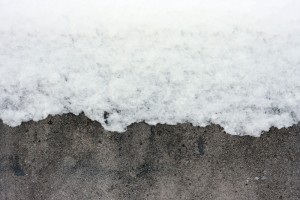Winter weather is here in Baltimore, which means rain, snow, ice, wind, and general poor weather. This weather can damage concrete due to the freeze thaw cycle and expansion and contraction. Learn more about the effects of winter weather on concrete, and how to protect your concrete in Baltimore.
Concrete Problems in the Winter
Freeze Thaw Cycle
The freeze thaw cycle occurs continuously as water freezes and melts. When water freezes, it expands, and when it melts, it contracts. This means that if there are any cracks in the concrete, water in them will expand when it freezes, making the crack bigger. The bigger crack lets more water in, this water freezes, and the crack gets bigger and bigger all winter. The greater the number of freeze thaw cycles, the worse this problem becomes.
Salt
Salt is not kind to concrete. There are several things that salt does to concrete.
- Salt is slightly acidic. This lowers the pH in concrete, which increases the size of the pores in concrete. This lets water into the pores, the water freezes, and cracks develop.
- Salt attracts and retains water in the pores of concrete because it is hygroscopic. This creates another problem known as slapping, where the surface of the concrete chips and flakes.
- Salt accelerates carbonation of concrete, which reduces its pH.
- Salt introduces chlorides into concrete, which corrodes steel reinforcements in the concrete.
How to Take Care of Concrete in the Winter
Seal It
This tip is technically for before winter, but using a protective coat of sealant on concrete will actively protect it from salt and ice in the winter. Seal concrete in the fall before winter weather for best results.
Remove Snow and Ice
When it snows, remove snow and ice from concrete surfaces as soon as possible.
Use Sand, Not Salt
Lay down sand on snowy walkways, not salt. Sand won’t help melt the ice, but it will give you traction, and it won’t hurt the concrete.
Avoid Deicers
Deicing chemicals are sometimes used to melt snow and ice. While they can do a good job, they’re harmful to concrete. If you do use deicers, use them only according to the manufacturer’s directions.
Are you in need of concrete repair in Baltimore? Contact Consolidated Coatings today!
About Consolidated Coatings Inc.
Consolidated Coatings is a full service building restoration contractor operating in Maryland, Virginia, and Washington, D.C. Since 1979, we’ve provided professional restoration of commercial, industrial, and historic buildings across a range of disciplines. These include masonry restoration, concrete restoration, decorative concrete, industrial and floor coatings, EIFS, and waterproofing. Follow us on our blog for weekly posts on industry-related topics. If you have any questions, please contact us at 410-574-6504.

